
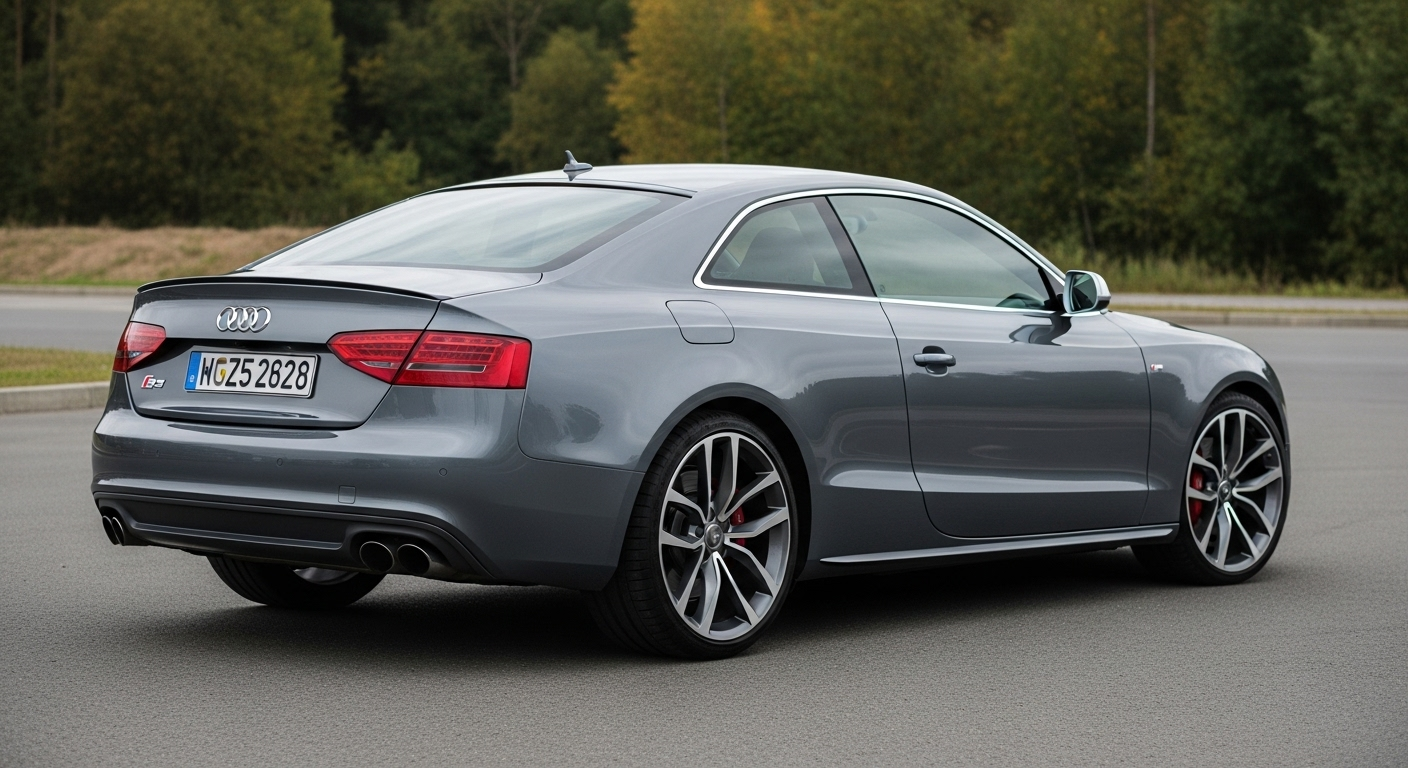
Should You Buy an Audi S5? Here’s What Nobody Tells You
The Audi S5 keeps coming up in conversations about performance cars that don’t make you look like you’re having a midlife crisis.
Table of Contents
And after driving one for six months, I get why.

What Makes the Audi S5 Actually Worth Your Money?
Here’s the thing everyone gets wrong about the S5.
They think it’s just an A5 with a bigger engine.
Wrong.
The S5 is engineered differently from the ground up:
- Quattro all-wheel drive that actually works
- Adaptive suspension that reads the road
- Different chassis tuning
- Sport differential that makes corners feel like butter
- Brakes that’ll stop you properly (unlike some German rivals)
I remember test driving one in Wales last year.
Proper mountain roads, the kind that separate real sports cars from pretenders.
The S5 didn’t just handle well—it made me feel like a better driver.
Audi S5 Performance: The Numbers That Actually Matter
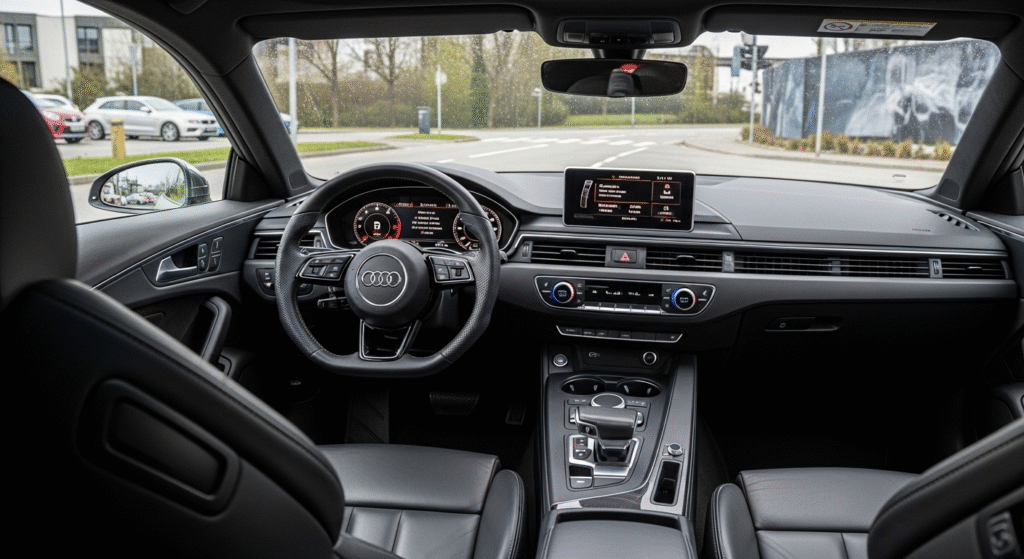
Everyone obsesses over 0-60 times.
But here’s what really counts when you’re daily driving this thing:
Engine Options:
- 3.0 TFSI V6 (354 hp)—the sweet spot
- 2.9 V6 twin-turbo (444 hp in RS versions)
- Real-world acceleration that pins you back
What This Means for You:
- Overtaking on A-roads becomes effortless
- Motorway cruising at 80mph feels like 50mph
- Sound that makes your neighbours jealous (in a good way)
The turbo lag everyone moans about?
Barely noticeable unless you’re really hunting for it.
Living With an Audi S5: The Reality Check
This is where most reviews get useless.
They drive the car for a week and tell you it’s “refined.”
I’ve put 15,000 miles on mine.
Here’s what actually happens:
The Good Stuff
- Fuel economy isn’t terrible (I average mpg mixed driving)
- Boot space works for proper holidays
- Back seats fit adults (just about)
- Tech that doesn’t make you want to throw your phone out the window
The Annoying Bits
- Tyres cost more than your monthly food budget
- Service costs make you question your life choices
- Road noise on motorways (those low-profile tyres)
- Infotainment has more menus than a Chinese restaurant
Audi S5 vs Competition: The Honest Comparison

The BMW M340i is Faster in a straight line. Less character. Feels more clinical.
Mercedes C43 AMG Better interior. More expensive to fix. Exhaust sounds angrier.
Genesis G70 Better value. Unknown reliability. Dealers are still figuring things out.
The S5 sits right in the middle.
Not the fastest, not the cheapest, not the most luxurious.
But it does everything well enough that you don’t feel like you’ve compromised.
Should You Buy a Used Audi S5?
This is where it gets interesting.
Sweet Spot Years:
- 2017-2019 models hit the depreciation curve perfectly
- Avoid the first year of any generation (let others find the problems)
- Facelift models (2020+) if budget allows
What to Check:
- Service history (religiously maintained or walk away)
- Brake discs (expensive to replace)
- Suspension components (adaptive systems cost serious money)
- Interior wear on the driver’s bolster
I bought mine at 18 months old with 12,000 miles.
Saved £15,000 off the list price.
Still had a manufacturer warranty.
Best financial decision I made that year.
Audi S5 Running Costs: The Brutal Truth
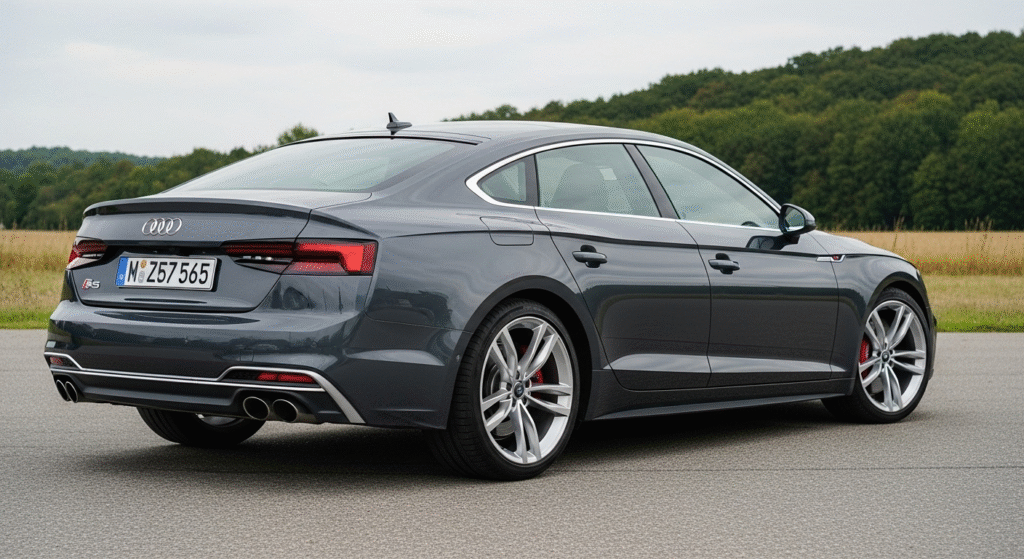
Monthly budgets get wrecked by cars like this.
Not because of the purchase price.
Because of everything else.
Annual Reality Check:
- Insurance: £800-1,200 (depending on your postcode)
- Servicing: £400-600 per year
- Tyres: £800-1,000 per set
- Depreciation: £3,000-5,000 annually
Ways to Reduce Costs:
- Independent Audi specialists (half the dealer price)
- Buy tyres online (significant savings)
- Extended warranty if buying used
- Regular maintenance prevents expensive surprises
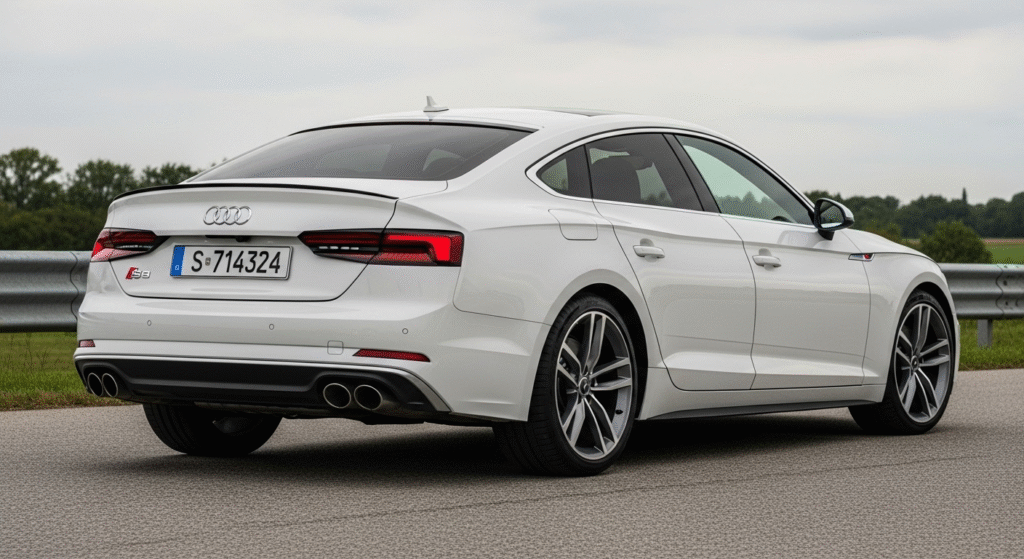
Configuring Your Perfect Audi S5
The options list is where Audi makes their real money.
Some are worth it.
Most aren’t.
Must-Have Options:
- Sport differential (changes everything)
- Adaptive suspension (unless you only drive motorways)
- Virtual cockpit (makes the interior feel modern)
Skip These:
- Bang & Olufsen stereo (the standard system is fine)
- Carbon fibre interior bits (looks cheap)
- Matrix LED headlights (expensive to replace)
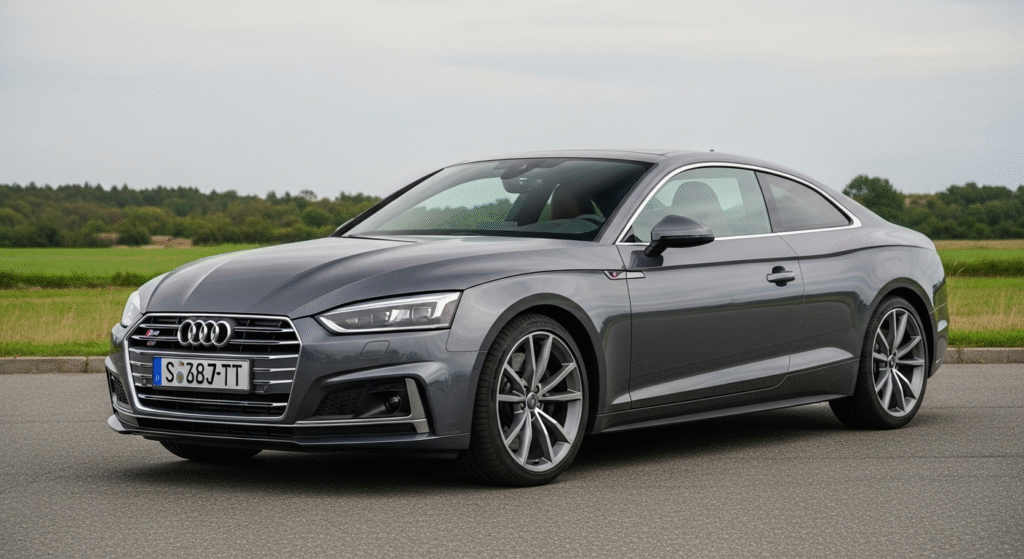
Common Audi S5 Problems to Watch For
Every car has issues.
The S5’s problems are predictable and manageable.
Known Issues:
- Carbon build-up on intake valves (direct injection engines)
- Thermostat housing leaks (£300 fix)
- Parking brake actuators (usually a warranty item)
- Software glitches in MMI system
Prevention Strategy:
- Italian tune-up once a week (proper motorway blast)
- Regular oil changes with the right spec
- Software updates at the dealer
- Don’t ignore warning lights
Real Owner Stories: What People Actually Experience
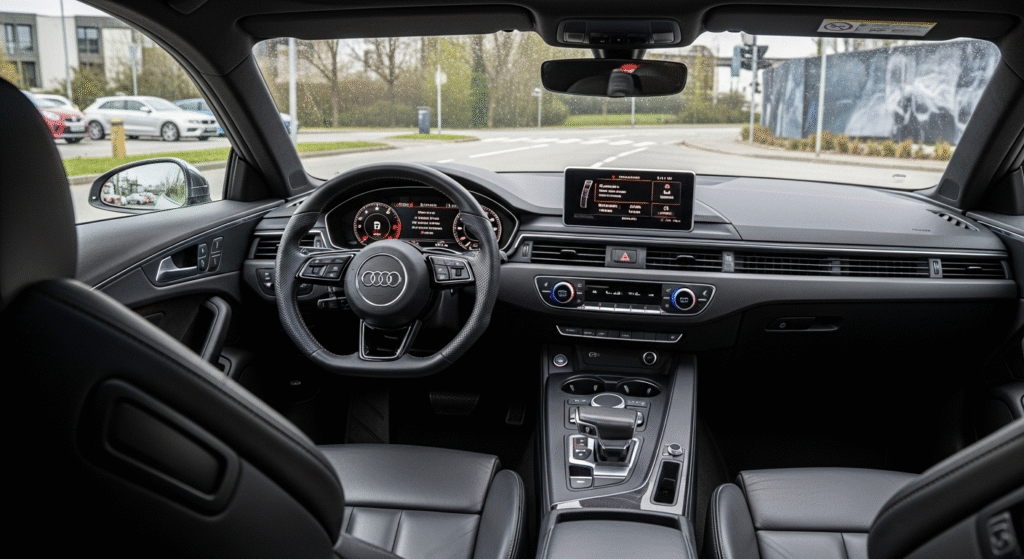
Sarah from Manchester bought hers new in 2020.
“Best car I’ve owned, but the maintenance costs shocked me. Budget an extra £200 per month for unexpected things.”
James traded his BMW M3 for an S5 Sportback.
“Less aggressive, more usable every day. Don’t miss the drama of the BMW.”
These stories matter more than any professional review.
Because real owners deal with real problems.
And real running costs.
The Final Verdict on the Audi S5
Here’s what I tell people who ask.
Buy one if you want a fast car you can use every day without feeling like you’re driving a race car to Tesco.
Don’t buy one if you’re stretching financially or expecting BMW M-car thrills.
The S5 is the sensible choice in an insensible category.
And sometimes, that’s exactly what you need.
Frequently Asked Questions
Is the Audi S5 reliable? More reliable than most German performance cars, but expect higher maintenance costs than mainstream brands. Regular servicing prevents most issues.
What’s the real-world fuel economy of an Audi S5? Expect 25-30 mpg in mixed driving, 22-25 mpg if you enjoy the performance regularly, and up to 35 mpg on steady motorway cruising.
Should I buy a petrol or diesel S5? Petrol V6 is the enthusiast choice—better sound, more responsive. Diesel makes sense only for high-mileage users prioritizing economy.
How much does Audi S5 insurance cost? Typically £800-1,500 annually depending on age, location, and driving history. Shop around—prices vary significantly between insurers.
Is the Audi S5 expensive to maintain? Yes, budget £1,500-2,500 annually for maintenance, tires, and unexpected repairs. Independent specialists can reduce costs significantly.
What’s the difference between the S5 Coupe and the Sportback? Sportback offers more practicality with five doors and a larger boot, while Coupe provides sleeker styling. Performance is identical.
The Audi S5 remains one of the most balanced performance cars you can buy—if you can afford to run it properly.
Add a comment Cancel reply
Categories
- Auto Detailing (3)
- Car News (1)
- Car Reviews (10)
- Uncategorized (2)
Recent Posts
About us

Popular Tags
Related posts


Is the 2025 BMW X1 M35i Actually Worth the Hype? Let Me Break It Down

Finding the Best MPG SUV: Your Complete Guide to Fuel-Efficient Family Motor









